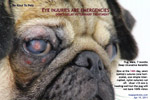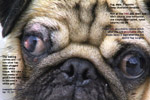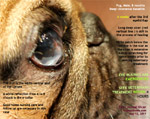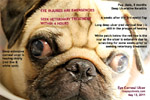|
Toa Payoh
Vets Clinical Research
Making veterinary surgery alive
to a veterinary student studying in Australia
using real case studies and pictures |
The case of the pug with a perforated corneal ulcer
Dr
Sing Kong Yuen, BVMS (Glasgow), MRCVS
12 May, 2011 |
 toapayohvets.com toapayohvets.com
Be Kind To Pets
Veterinary Education
Project 2010-0129 |
March 24, 2011 was a day to remember due to the
following 3 incidents.
1. The Junior College student with straight As and 1 B and an
excellent testimonial from her form teacher could not work "long
hours." She had phoned me the previous night to let me know that she
would not work the long hours of internship as it was "tiring". So, I
told her that I would phone her back regarding her terms and
conditions of work. That implied that she ought to stay at home till I
decided since my offer was not accepted. Yet she presented herself at
the Surgery today at 8 am as I had told my assistant Mr Saw that the
intern would not be coming.
I asked if her father or mother was against her working hard? She had
no objection to the hours of work during the interview yesterday and
even arranged for her driving test lessons to take place at 5 pm on
Friday. She would work 6 days a week with one weekend day off. She
arranged for 6 weeks of internship - a very short period but that
would give her some credentials as she had applied for an AVA
veterinary undergraduate scholarship.
Apparently her father was against it. "You will be going overseas to
study," I said sadly to this young personable lady who did not need to
take the "O" level examinations unlike the average Singaporean student
as she was the "top 10% of her cohort likely to go to the university."
"Your working hours are non-negotiable. In any case, you will be off
before 5 pm on Friday for your driving test at Bukit Batok and you
don't work on one Saturday or Sunday." I was rather sad that she could
not put her foot down for her own future. "You need to think for
yourself and not get tied to the apron's strings."
I wished her good luck and let her go. Over-protective Singaporean
parents who think that the world owes their academic
superstar-children a living will be in for a rude shock when their
children goes to the real world of commerce as their attitude doesn't
make the progeny street-wise and realistic.
2. Mr Saw phoned me at 11.30 am while I was at the Singapore General
Hospital area to say he was not feeling well and would try his best.
He had generalised muscular aches. I often told him: "You are a young
man." But he would say "I have an old man's body."
Mr Saw is a very responsible assistant and if he was a Singaporean, he
would make a very good vet. I could see that he has the passion during
the past 3 years with me and I had mentored him with whatever
knowledge of the skills of surgery and medicine I had.
I rushed back after taking a few photos of Everton and Spottiswood
Park conservation houses (bright sunshine - good for pictures).
3. I told my associate vet that Mr Saw was sick and he would be taking
time off. I would be the customer service officer taking money and processing the
credit card and nets machine as my other staff was on leave.
Another assistant Mr James Ang had retired at the age of 73
years as he was bent double for some unknown reason. I had to let him
go in February after some 20 years with me. He would be giving
prospective clients a bad impression compared to the nubile young
girls at competitor's practice as he was hunched as if he could not
stand straight.
Two days ago, the mother and adult daughter of a Maltese with red eyes
had smiled at me when they saw me handling the payment at reception
counter after consultation with my associate vet. They were old clients. The
daughter had now become a grown up in her early 30s. I said: "Like the
PAP who introduce new politicians at the elections, I must renew the
vets at Toa Payoh Vets. Young vets, new ideas.
Lots of energy."
Soon, 3 young adults in their early 30s (2 ladies and one gentleman)
came in with a pug with a bleeding leaking eye. I got them registered
as they were new clients. I could see that one of the two young ladies
was quite distressed. My associate vet handled the case as usual. I could
see that it was a case of a central corneal ulcer, a common problem in
breeds with protruding eyeballs.
"So what happened?" I asked the gentleman who came out of the
consultation room and sat on the yellow chair after some minutes of
discussion with my associate vet. I had been inside the room to
evaluate the eyeball at one time but left without comments. He said: "The doctor is making
arrangements to hospitalise the pug."
I was extremely surprised. Associate vets do get some freedom to do
their cases in the manner they deem fit. Toa Payoh Vets is equipped with anaesthetic and surgical
facilities and is capable of handling a corneal ulcer case. Referring
what I considered to be a simple case of corneal ulceration to be
hospitalised in another
practice in Singapore was a big shock to me.
I don't want the vets at Toa Payoh Vets to be known as the "Old School
Vets". This term was made known to me from a staff of a practice I
visited last week as I brought a young male intern with a blue golden
lock of forehead hair to visit the practice to buy some vaccines.
The lady manager in this practice where the vets will refer every
"difficult and potentially litigious" surgical case to a brand-name
practice said to me: "My friend asks me which veterinary clinic I was
working and when I told her, she said I was working with an 'Old
School Vet'. I don't mind. I am very happy and well treated in this
clinic."
So, this practice does vaccination, dental scaling, sterilisation and removal of
lumps. Nothing more complicated. This definitely was not the sort of
veterinary surgery I practise for the past 30 years.
Now my associate vet now making phone
calls to another brand name practice to pass the case over.
This passing the buck of a simple case of corneal ulcer is not for
associate vets of Toa Payoh Vets. If any associate vet can't perform
surgery of a simple corneal ulcer and refers to a 2nd a brand name
competitor, there is the "can't even do a simple corneal ulcer
case" implication.
I know some vets dislike complicated surgeries as they are potentially
litigious but this was a simple corneal ulcer case, in my observation.
I went to the consultation room and asked my
associate vet what was going on. Why was she referring to a brand name
practice? She showed me the letter from Vet 1 to consult a certain vet
in a brand name practice and since that vet was unavailable, she made
alternative arrangements. Eye injuries are emergencies
and ought to be treated within 4 hours. Now, it was 5 days post
injury.
I was extremely surprised as my associate had at
least 2 years of practice before joining me. If she
could not deliver, she ought to consult me. There was this potential
of the competitor's vet and staff labelling and bad-mouthing Toa Payoh Vets as being incompetent to
handle a corneal ulcer.
I asked the owners to leave the consultation room, closed the door and
had a private chat with my associate vet. I said: "This is going to be a highly contentious case as there is a
lot of emotion involved as Vet 1 had given a name of a vet who would
not take the case. The owners are much distressed. You just
refer them to another practice.
That
practice employs fresh graduates and rookie vets. You are not doing
the dog a favour by just making appointment for an unknown vet to
handle this case if the older vet was not available. I will take over
this case as the owners are going to be unhappy should the other vet
mis-treat this case."
If I refer a case to a vet, I must make sure that this vet has the
relevant experience and a high standard of practice and will perform
the surgery and not his fresh employee graduates. It does not mean
that this vet must be employed in a brand name swanky practice.
I was in
the consultation room earlier too but the associate did not introduce
me and I did not introduce myself too. So, the distressed lady was
apprehensive when I examined the dog's eye and tried to pull the dog
back. So I left the room for my associate vet to manage the case.
I was around and yet she did not think of asking me for
advice when issues and problems arise. Life for a practice manager is full of surprises and changes.
I told my associate to ask the clients to come in and to formally
introduce me as that would be the correct way in professional
practice. This case was high
voltage and lightning had struck. The pug's eye was going to collapse
any time soon and any miscommunication or bad referral resulting in
the pug being blind would have cast Toa Payoh Vets in a bad light.
"The owners must be thinking I am just a receptionist since I was
registering their case," I said to my associate. "This case is going
to adversely affect the reputation of the Surgery if the brand
name practice vet bungles the surgery. How do you know whether that
this brand name practice will or will not assign a fresh vet with no experience in
handling a Descemetocoele? This corneal ulcer is in a highly dangerous
state as it is
going to perforate soon.
"You know that this brand name practice's senior vet may not be
available. If he assign a fresh vet to do it, the cornea perforates
on the way to the vet, the pug goes blind. So, the owners would just bad-mouth Toa Payoh
Vets as the practice that referred the case." I did not mention that
this brand name practice charges top dollars and this case would set
the owners back by over a thousand dollars.
My associate opened the door and asked the 3 adults and pug to come in. She
introduced me as her boss.
"I am the founder of this practice," I elaborated. "I did not
introduce myself earlier in the consultation room. I am responsible
for the practice management." I was the licensee and any complaint or
litigation would mean I have to waste time attending to
investigations. I had assessed that the clients were sophisticated and
knowledgeable and this is the profile of the younger generation.
Whether they would complain about being passed the buck by Toa Payoh
Vets would depend on how this emotional situation was handled and
whether their pug's eyeball would be enucleated by the other vet.
Owners just don't like the idea of their pets losing an eyeball.
This was a case that had a 50:50 chance of saving the dog's eye. If
the vet knows how to resolve the problem.
The gentleman summarised the situation succinctly: "There is no one
vet you can recommend to treat my pug." He must have superman's
hearing as he was in the waiting area and he could not have had heard
my conversation with the associate vet.
I said: "It is not necessary
to refer the case at all as Toa Payoh Vets has the capability and
experience to handle this case.
"I have handled several cases of corneal ulcerations and if
you have no objection, I will do the 3rd eyelid flap. Have you visited
Toa Payoh Vets' webpage on eye problems in the dog?"
Such sophisticated young adults would have had checked up Toa Payoh
Vets' website at the waiting area with their iPhone 4 while I was
having a closed-door discussion with my associate vet. The world has
changed tremendously. Internet information flows freely and the
clients know much more than the vet sometimes.
The gentleman said: "You operated mainly on Shih Tzus' eyes." This was an excellent
feedback from him. I had not analysed my webpage on eye problems in
the dog at www.toapayohvets.com. I had not posted other
breeds I had treated as it is extremely time-consuming to create
webpages to write the case
report of all breeds I operated upon. I don't take pictures of all
breeds too.
This article took 6 hours to write and to create the supporting
images. There are so many
things I want to do and I just can't
have time to do many of my favourite things if I write case reports of
all breeds having corneal ulcers. As a vet who does surgery, the range
of surgical cases is from the head to the tail.
I replied: "Shih Tzus have the highest number of eye injury problems in
my practice. Any breed with protruding eyeballs may suffer from this
corneal ulceration problems. This includes the Pekinese and the Pug."
To cut a long story short, the owners had no objection in my
performing the surgery. If they were not comfortable, I would just ask
them to make their own decision to select their own vet.
My associate vet watched me doing the surgery. She said she
had not seen me doing a surgery. Many of my surgical cases have been
passed on to her to do and that was why I had less to do.
This is how I managed the corneal perforation case surgically:
INFORMED CONSENT. I took time to explain the risks of
anaesthesia (death as this pug was infected for the past 5 days and
could be infected in the blood stream. A delay of 24 hours with
antibiotics prior to surgery would be preferred but this was an
emergency as the cornea will perforate soon. I advise that I would
give baytril antibiotics IV and perform the surgery soon).
I explained the risk of surgery (bleeding, pain, infection, collapse
of the eyeball due to infection leading to the possibility of
enucleation as the owner had not consulted the vet within 4 hours of
the eye injury). The gentleman signed the form.
SEDATION & ANAESTHESIA
"Isoflurane gas alone is the safest anaesthetic for this young pug of
7 months with a possibility of infection of the past 5 days," I said
to Mr Saw who takes close notes as he would be operating his own
practice in Myanmar soon. "However, the pug's nose is flat and the pug
will struggle a lot, leading to perforation of the cornea and collapse
of the eyeball. So, what sedation would you give? Your favoured
domitor and ketamine IV?"
Mr Saw was not so sure. This was a pug with suspect infection after 5
days or more of eye injury. The pug's eye look like an earthquake and
tsunami disaster area as seen in the recent pictures of the calamity
in Japan. Big patch of white gel and a stream of red-tinged flow of
gel and blood at one end, measuring around 1.5 cm long. A continuous
stream if you are observant. It reminded me of the oil spill in the
Gulf of Mexico although I did not see the actual leak - only oil
slicks in the ocean. Here, I could see the stream. It was fascinating
as a case but extremely dangerous for the pug. A delay in treatment
and the corneal hole would enlarge and the inside aqueous humour would
just splash out. The end of the eyeball, although the vet can still
stitch up the cornea. Most vets will not encounter such corneal
ruptures or stitching and so it can be quite frightening to encounter
this case.
I used 0.2 ml xylazine IV. Waited 5 minutes. The pug vomited out its
food as this was the effect of xylazine (and even in domitor or
domitor/ketamine IV) Then isoflurane gas.
SURGERY
The 3rd eyelid flap is done. Basically the needle goes into the upper
eyelid, then under the 3rd eyelid and back out to the lower eyelid.
Tied in a knot. "It will be easier if an assistant pulls out and
upwards the 3rd eyelid for stitching," I said to my associate vet as
Mr Saw automatically used forceps to do it for me.
SUTURE PATTERNS
Several combinations. For this case, I use 3 simple interrupted
sutures. Another case, I used a horizontal mattress and one
interrupted. Or just one horizontal mattress.
Question. "Are 3 sutures sufficient?" - Yes.
SUBCONJUCTIVAL INJECTION OF GENTAMYCIN AND DEXAMETHASONE.
I know some vets believe that steroids should not be used in eye
ulcerations. Well, a small drop of dexamethasone will alleviate the
inflammation and pain and does not cause harm.
"Get me the prednisolone," I said to Mr Saw. He got me the depot
prednisolone and I rejected it. It is best to use dexamethasone or
prednisolone meant for IV." Well, Mr Saw did as instructed but got the
incorrect type. All vets must check the medication before injection.
Well, Mr Saw learnt something from this participation in the case.
"Use common sense," I said to Mr Saw. I wonder whether he knows what
is the meaning of common sense as applied to his offer of depot
prednisolone. Details of surgery and comments in 8 pictures at webpage
of Toa Payoh Vets - goto DOGS - EYE PROBLEMS or at:
http://www.bekindtopets.com/animals/20081201PAGE3_
Dog_Surgery_Anaesthesia_Eye_ToaPayohVets.htm
POST-OP DAY 1 & 2
The IV drip continued. Tolfedine and baytril given SC. The pug was
sleeping and woke up fresh the next day. Very active. At 3 pm on day 2, the
gentleman and his wife visited. They took leave from work. It was one of those money can't buy
joys to see the distressed lady back to her normal self. I
expect the pug's ulcer to heal in 14 days' time and the pug to go home
on Day 3. The outcome should be a white spot in the centre of the
cornea and no eyeball collapse or infection.
RETROSPECTIVE REVIEW
1. Why did Vet 1 refer the case to a vet that is not available? This
is a mystery to me.
He probably thought that the cornea ulcer was extensive, needed
stitching and he had no facilities to do it and had referred to my
associate vet. However, I was on counter duty and saw the case first.
The eye ulcer looked terrible as if it had a big earthquake. It
appeared to be a white reddish gel patch of at least 5-8 mm in
diameter. Actually, it was 1-2 mm in diameter when I used a scalpel to
scrape away the out flowing blood clot. After scrapping, I showed my
assistant the black hole measuring around 1 mm in diameter. Aqueous
humour leaked out from the hole. Surrounding the black hole was a
circle of basement membrane measuring around 4-7 mm in diameter with
the black hole as the centre. This membrane would rupture soon if the
owners just don't bother to see Vet 1 who advised emergency eye
treatment correctly and professionally.
To estimate the size of the corneal perforation, see the 'stream' of
gel coming out as a streak. It was around 2-3 mm. See the images.
2. The pug had a perforated ulcer, not a Descemetocoele. The initial
presentation was similar to a Descemetocoele with a streak of
gelatinous or eye discharge. So, I said "Descemetocoele" to my
associate at the examination room as the dog did not permit proper eye
examination.
Under general anaesthesia, after scrapping away the blood clot, a
black hole of 1mm x 1mm with watery aqueous seeping out indicates that
the correct diagnosis is a perforated corneal ulcer also known
as deep ulcerative keratitis.
3. Corneal wounds can be sutured with fine 6/0 sutures. Small
perforations are best left to heal with the 3rd eyelid flap surgery.
And they do heal very well if the inside of the eyeball is not
infected. Can you see the pinkish-reddish blood sediment on the medial
inner side of the eyeball in one of the pictures below?
I hope this report will be useful for undergraduates struggling to study so many
subjects for their examinations to appreciate the anatomy of the dog's
eye and its changes during ulceration.
For readers of my blog, updates and more pictures are in
toapayohvets.com, goto DOGS - EYE PROBLEMS.
http://www.bekindtopets.com/animals/20081201PAGE3_
Dog_Surgery_Anaesthesia_Eye_ToaPayohVets.htm |
|
|
|
|
UPDATES 2 weeks and 6 weeks later
|
 |
 |
|
14 days after 3rd eyelid
flap.
On
the 14th day, the pug came in for stitch removal. The leak had been plugged by an abundant
cap of white scar tissue. 30 days after 3rd eyelid flap
surgery as I write this update, the young couple has no
complaints. |
 |
 |
|
42 days after 3rd eyelid
flap. The ulcer is healing
slowly as it is deep and
extensive.
On
the 42nd day, the owner came
for a review as the dog's
eyes were reddish. However,
the vertical ulcer has
healed but not fully while
the 6-8 o'clock corneal
ulcer has changed to a white
spot. |
|
The
pet shop operator had sold the pug with the right eye
ulcer already present. I had focused on the right eye
due to the drama of the situation. The left eye cornea
was already pigmented (when I review the images again
after the owner came on the 42nd day) due to
long-standing injury at the pet shop.
Both eyes ought to be examined. There was much stress
and worries about losing the right eye due to the fact
that the owner's "eye-specialist" vet referred to by
another vet was not available. My associate vet was
trying to refer them to another vet before I stepped in.
I prioritised my time in treating the right eye and
resolve the owner's problem first.
It seems that the right eye is saved in the sense that
it did not rupture and deflate. The excellent
post-operation care by the young couple has been
important in this case.
NEVER buy a pug with eye injuries from the pet shop or
breeder unless one is kind and prepared to spend money
and time to send the dog for prompt veterinary
treatment. Pugs for sale are quite rare in Singapore and
so the very few pug lovers have very few choices of
getting really good conformation pugs.
|
|
To
make an appointment: e-mail
judy@toapayohvets.com
tel: +65 9668-6469, 6254-3326 |
 toapayohvets.com toapayohvets.com
Be Kind To Pets
Veterinary Education
Project 2010-0129 |
|
|
 Toa
Payoh Vets Toa
Payoh Vets
Clinical Research
|
|
|
Copyright ©
Asiahomes Internet
All rights reserved. Revised: May 12, 2011
Toa Payoh Vets
| |
 TOA
PAYOH VETS
TOA
PAYOH VETS TOA
PAYOH VETS
TOA
PAYOH VETS